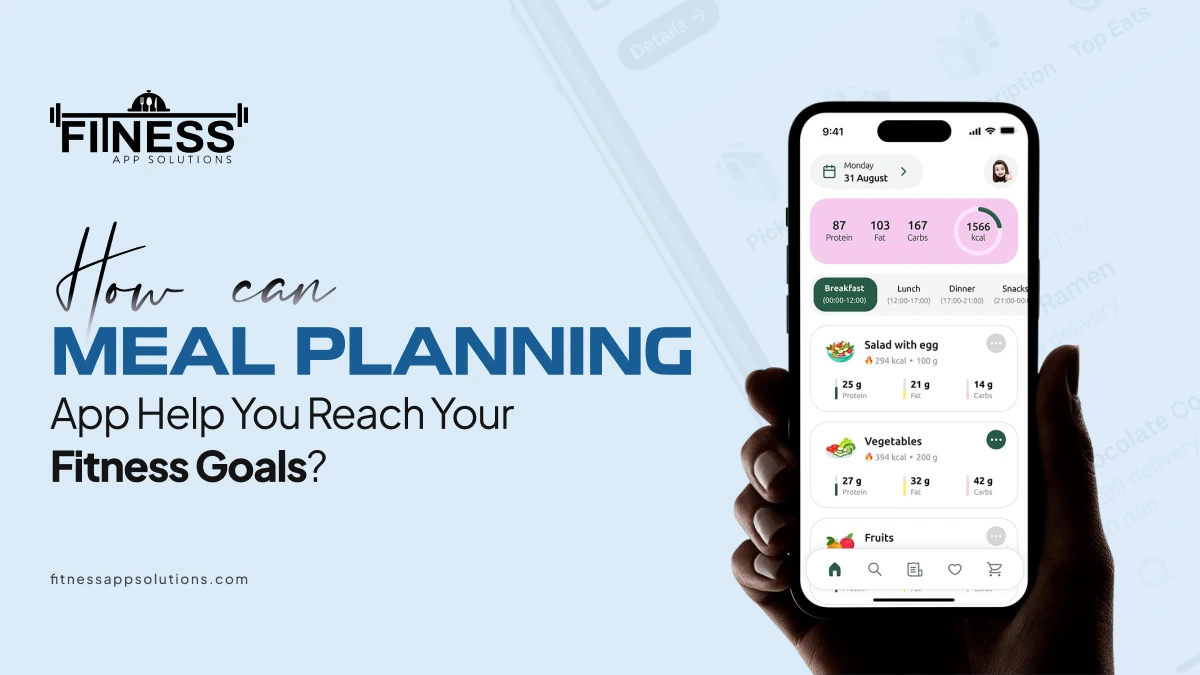Meal planning is an essential step in reaching the fitness goal. Having pre-planned and a balanced meal plan is necessary with the tailored exercise plan. Reaching your fitness goals often hinder on a consistent and healthy diet. This is where a meal planning app can be a powerful tool. By simplifying nutrition, saving time, and providing personalized guidance, these apps can significantly support your journey towards a fitter, healthier you.
What is Meal Planning?
Meal planning simplifies as making a structures schedule for food. It includes scheduling user’s breakfast, lunch, dinner and Snacks timings. It involves the timings of having food and its amount. The planned meals contain a wholesome amount of nutrients requiring for a balanced lifestyle.
This app helps users to plan their meal according to their requirement. These apps have many features integrated into it. These features help users to plan their meals thoroughly. It also integrates the feature of listing the grocery items and ingredients required to prepare the meal as per the plan.
How Meal Planning Apps Work?

-
Personalized Plans:
Many apps allow you to create a profile and customize your plan based on factors like dietary restrictions, allergies, and fitness goal.
-
Grocery List Integration:
These apps often generate grocery lists based on your meal plan, streamlining your shopping trips.
-
Recipe Suggestions:
Many apps provide access to a vast library of healthy and delicious recipes that align with your dietary needs.
What are the types Of Meal Planner Apps?

1.Meal Planner:
Meal planner apps are growing popular nowadays. Meal planner apps help people in creating a proper meal plan considering their taste buds and the essential nutrients for body. These apps have a feature of profile creation and customization and many other related features that allow the app to plan meals according to users’ preference and requirement.
2.Diet Apps:
Diet apps basically focus on tracking your eating habits and activity. For this first you should mention details regarding your health, body, weights, and other essential medical details then diet app will create your diet plan considering these details. These apps also track your daily nutrient intake needed to keep your body healthy and fit.
3.Intermittent Fasting Plan Apps:
Intermittent fasting plan apps plan your meal that helps in losing weight without tracking calories, carbs, proteins, etc. In Intermittent fasting you are eating for a certain hours of the day rest of the time you are fasting. The schedule for intermittent fasting is decided as per the plan you choose.
4.Nutrition App:
Nutrition apps develop meal plans while balancing the nutrient requirements of the body. Apart from this, recipes for delicious food rich with various nutrients are also available through this app. It tracks the daily intake of nutrients. It also tracks down the daily activities that impact on your daily nutrient intake.
5.Calorie Tracker:
Track your daily calorie intake with a calorie tracker. This app will provide you with a proper meal plan balancing your daily intake of calories, saturated fats, carbs, and many other nutrients. It tracks your daily eating habits. It creates a whole plan and schedule of fitness activities complementing your calorie intake.
6.Weight Gain/Loss App:
These apps customize your meal plan according to your choice of weight gaining or losing. You should fill in details related to your weight, medical issues (if any), preferences and other related details. These apps provide meal plans and exercise plans as per your preference.
What are the Benefits of Meal Planning App?
1.It reduces food waste by minimizing impulse purchases and encourages you to cook at home more often.
2.It streamlines meal preparation and grocery shopping, freeing up valuable time.
3.Encourages you to make healthier food choices by providing access to nutritious recipes and meal ideas.
4.Helps you ensure you’re getting the right balance of macronutrients and micronutrients.
5.It provides a sense of structure and accountability, making it easier to stick to your healthy eating plan.
How Meal Planning App Ensures Fitness Goals?

Personalized Nutrition:
Tailored plans align with your specific nutrient needs like protein, carbohydrates, fats and other nutrients based on your fitness goals like weight loss, muscle gain, regular fitness and many other. The app can adjust your meal plan based on your fitness goals. Prioritize meals with a moderate calorie deficit, focusing on lean protein, complex carbohydrates, and healthy fats to maintain satiety and prevent muscle loss.
Calorie Tracking:
Helps you monitor your calorie intake and adjust your meals accordingly to support your weight management goals. The app can accommodate various dietary needs and preferences, such as vegetarian, vegan, paleo, keto, gluten-free, and allergies. This ensures your meal plan aligns with your specific requirements. If you’re exceeding your calorie target, the app can help you identify areas for adjustment, such as portion control or choosing lower-calorie options. Conversely, if you’re not consuming enough calories, the app can suggest adjustments to ensure you’re meeting your energy needs.
Macro Tracking:
The app can help you set specific targets for protein, carbohydrates, and fats based on your fitness goals. For example, if you’re aiming for muscle gain, the app might suggest a higher protein intake. By tracking your macronutrient intake, you can ensure you’re meeting your daily targets and making progress towards your fitness goals. If you’re falling short on a particular macronutrient, the app can suggest adjustments to your meals, such as adding a protein source or increasing carbohydrate intake.
Hydration Reminders:
Adequate hydration is crucial for optimal fitness performance, recovery, and overall health. Dehydration can negatively impact exercise performance, increase fatigue, and hinder weight management efforts. Many apps include customizable hydration reminders to encourage consistent water intake throughout the day. Some apps allow you to track your water intake, helping you stay on top of your hydration goals.
Fitness Integration:
Some apps integrate with fitness trackers to provide a more genuine review of your overall health and progress. This integration provides a more comprehensive picture of your overall health and fitness. Based on your activity levels, the app can adjust your calorie and macronutrient targets accordingly. For example, if you’ve had a particularly intense workout, the app might suggest increasing your calorie intake to support recovery.
Conclusion
Adding a meal planning app into your fitness journey can be a game-changer. By simplifying nutrition, saving time, and providing personalized guidance, these apps empower you to make informed food choices, stick to your dietary goals, and ultimately achieve your fitness objectives. Whether you’re aiming for weight loss, muscle gain, or simply a healthier lifestyle, this app can be a valuable tool to support your success. Remember to choose an app that aligns with your specific needs, preferences, and budget, and utilize its features effectively to maximize its benefits.
Frequently Asked Questions (FAQs)
Question1: – What is meal planning?
Ans: Meal planning simplifies as making a structures schedule for food. It includes scheduling user’s breakfast, lunch, dinner and Snacks timings.
Question2: – Why is meal planning important?
Ans: It reduces food waste by minimizing impulse purchases and streamlines meal preparation and grocery shopping, freeing up valuable time.
Question3: – What are the types of meal apps?
Ans: There are various types are: – Meal planner, Diet apps, Intermittent fasting plan apps, Nutrition app, Calorie tracker, Weight gain/loss app and many more.
Question4: – What is Calorie tracker?
Ans: This app will provide you with a proper meal plan balancing your daily intake of calories, saturated fats, carbs, and many other nutrients. It tracks your daily eating habits.
Question 5: – Why is nutrition tracker app important?
Ans: Nutrition apps develop meal plans while balancing the nutrient requirements of the body. It tracks the daily intake of nutrients. It also tracks down the daily activities that impact on your daily nutrient intake.



